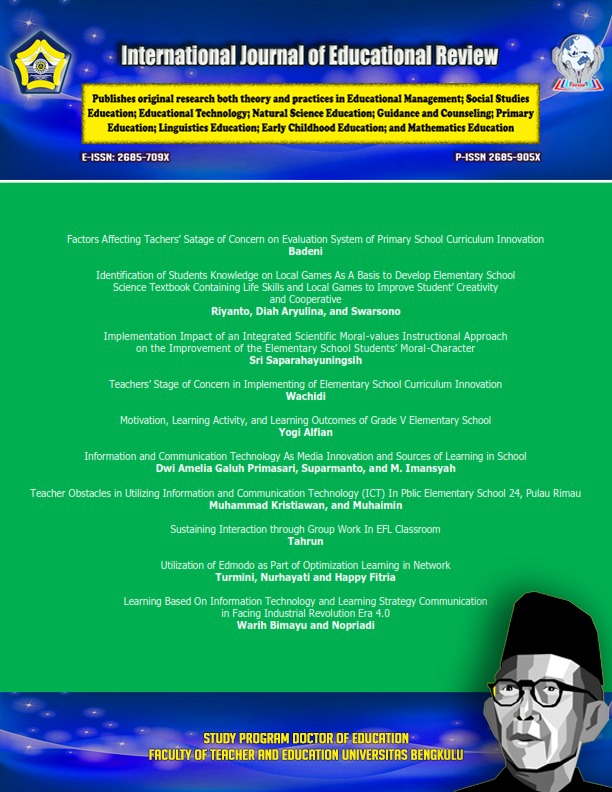Perceived Choices of Graduation among Master Students: Expectancy-Task Value Theoretical Perspective
DOI:
https://doi.org/10.33369/ijer.v4i2.22021Keywords:
Perceived Choices, Expectancy, Task Value, Motivational BeliefsAbstract
This study investigated whether motivational beliefs (expectancy of success and value in research and practice related tasks) among master students predict the achievement related choices for graduation (thesis or non-thesis) and examined the likelihood of those motivational beliefs in thesis and non-thesis preferring group. Participants studied in various master programs of two universities in Cambodia completed the questionnaires about their expectancy of success and values toward research and practice related tasks and preferences of graduation. Results of logistic regression analysis revealed that, among the motivational beliefs, only cost in research indicated a significant predictor of graduation preferences (p = .003). Furthermore, the associated likelihood of thesis preferring group was anchored at students who have higher positive beliefs on cost in research (ß = 2.386, p = .003, Exp (ß) = 10.867, Odd = 986.9), interest in research (ß = .933, p = .431, Exp (ß) = 2.542, Odd = 154.2), utility in practice (ß = .835, p = .226, Exp (ß) = 2.306, Odd = 130.6), and attainment in research (ß = .218, p = .699, Exp (ß) = 1.243, Odd = 24.3) although the rest of expectancy-values components was not completely discriminated in its membership model. Implications of the findings to graduate programs and future direction are discussed.References
Atkinson, J. W. (1957). Motivation determinants of risk taking behavior. Psychological Review, 64, 359-372.
Bong, M. (2001). Between- and within-domain relations of academic motivation among middle and high school students: Self-efficacy, task value, and achievement goals. Journal of Educational Psychology, 93, 23–34. doi:10.1037//0022-0663.93.1.23.
Convington, M. V. (1992). Making the grade: A self-worth perspective on motivation and school reform, New York: Cambridge University Press.
Denissen, J. J. A., Zarrett, N. R., & Eccles, J. S. (2007). I like to do it, I’m able, and I know I am: Longitudinal couplings between domain-specific achievement, self-concept, and interest. Child Development, 78, 430–447. doi:10.1111/j.1467-8624.2007.01007.x
Eccles J. S., Adler, T. F., Futterman, R., Goff, S. B., Kaczala, C. M., Meece, J. L., & Midgley, C. (1983). Expectancies, values, and academic behaviors. In J. T. Spence (Ed.), Achievement and achievement motivation (pp. 75–146). San Francisco, CA: W. H. Freeman.
Eccles, J, S., Adler, T. F., & Meece, J. I. (1984). Sex differences in achievement: A test of alternate theories, Journal of Personality and Social Psychology, 46, 26-43.
Eccles, J. S. (1984). Sex differences in achievement patterns. In T. Sonderegger (Ed.), Nebraska Symposium on Motivation, 32, 97-132. Lincoln: University of Nebraska Press.
Eccles, J. S. (1987). Gender roles and women’s achievement-related decision. Psychology of Women Quarterly, 11, 135-172.
Eccles, J. S. & Harold, R. D. (1991). Gender differences in sport involvement: Applying the Eccles’s expectancy-value model. Journal of Applied Sport Psychology, 3, 7-35.
Eccles, J. S., Wigfield, A., Harold, R., & Blumenfeld, P. B. (1993). Age and gender differences in children’s self- and task perceptions during elementary school. Child Development, 64, 830–847.
Eccles, J. S., & Wigfield, A. (1995). In the mind of the achiever: The structure of adolescents’ academic achievement related-beliefs and self-perceptions. Personality and Social Psychology Bulletin, 21, 215-225.
Eccles, J. S. (2005). Subjective task values and the Eccles et al. model of achievement related choices. In A. J. Elliott & C. S. Dweck (Eds.), Handbook of competence and motivation (pp. 105–121).
Feather, N. T. (1988). Value, valences, and course enrolment: Testing the role of personal value within expectancy-value framework. Journal of Educational Psychology, 80, 381-391.
Krapp, A. (2002). Structural and dynamic aspects of interest development: Theoretical considerations from an ontogenetic perspective. Learning and Instruction, 12, 383–409. doi:10.1016/S0959-4752(01)00011-1.
Meece, J. L., Wigfield, A., & Eccles, J. S. (1990). Predictors of math anxiety and its influence on young adolescents’ course enrollment intentions and performance in mathematics. Journal of Educational Psychology, 82, 60–70. doi:10.1037/0022-0663.82.1.60.
Rose, M. (2012). Graduate student professional development: A survey with recommendations. The Canadian Association for Graduate Studies.
Schwanzer, A. D., Trautwein, U., Lu¨dtke, O., & Sydow, H. (2005). Entwicklung eines Instruments zur Erfassung des Selbstkonzepts junger Erwachsener [Development of a questionnaire on young adults’ selfconcept]. Diagnostica, 51, 183–194. doi:10.1026/0012-1924.51.4.183.
Trautwein, U., Marsh, H. W., Nagengast, B., Ludtke, O., Nagy, G., Jonkmann, K. (2012). Probing for the multiplicative term in modern expectancy-value theory: A latent interaction modeling study. Journal of Educational Psychology, 104, 3, 763-777.
Weiner, B. (1992). Human motivation: Metaphor, theories, and research. Newbury Park, CA: Sage.
Wigfield, A., & Eccles, J. (1992). The development of achievement task values: A theoretical analysis. Developmental Review, 12, 265–310.
Wigfield, A. (1994). Expectancy-value theory of achievement motivation: A developmental Perspective. Educational Psychology Review, 12, 1-14.
Wigfield, A., & Eccles, J. S. (2000). Expectancy-value theory of motivation. Contemporary Educational Psychology, 25, 68-81.
Downloads
Published
How to Cite
Issue
Section
License

This work is licensed under a Creative Commons Attribution-ShareAlike 4.0 International License.




